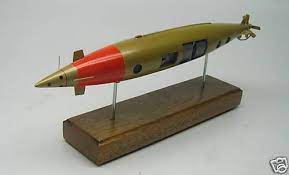In 1874 Louis Brennan stumbled on the paradox that it was possible to make a machine travel forward by pulling it backward.
The Brennan torpedo had reels of wire inside.
The other end of the wires was attached to an engine on shore to wind
the wire in.
The rotation of the reels then drove the water propeller that then propelled the vehicle
away
from its start point.
He demonstrated this by means of a cotton reel, with a pencil thrust through the hole in the centre.
By resting the ends of this pencil on two books and unwinding the cotton by pulling it from underneath he caused the reel to roll forward,
the harder he pulled, the faster the cotton unwound, and the quicker the reel travelled in the opposite direction.
The torpedo had a range of 2000 yards and the speed was between 20 and 27 knots.
It was patented in 1877 and between 1890 and the turn of the century the British Army installed more than 10 different
launching points to protect harbours in Britain and different locations in the British Empire. Some remains of these can
still be seen.

Further
information on Wikipedia
How does
this relate to sailing direct into the wind powered by the wind?
When the
ability of a windmill boat to sail directly against the wind that
powered it. was shown.
several observers claimed that it was impossible for a craft to progress
in the
opposite direction to the force which powers it. But the Brennan torpedo
shows it is possible.
Return
to homepage
|
